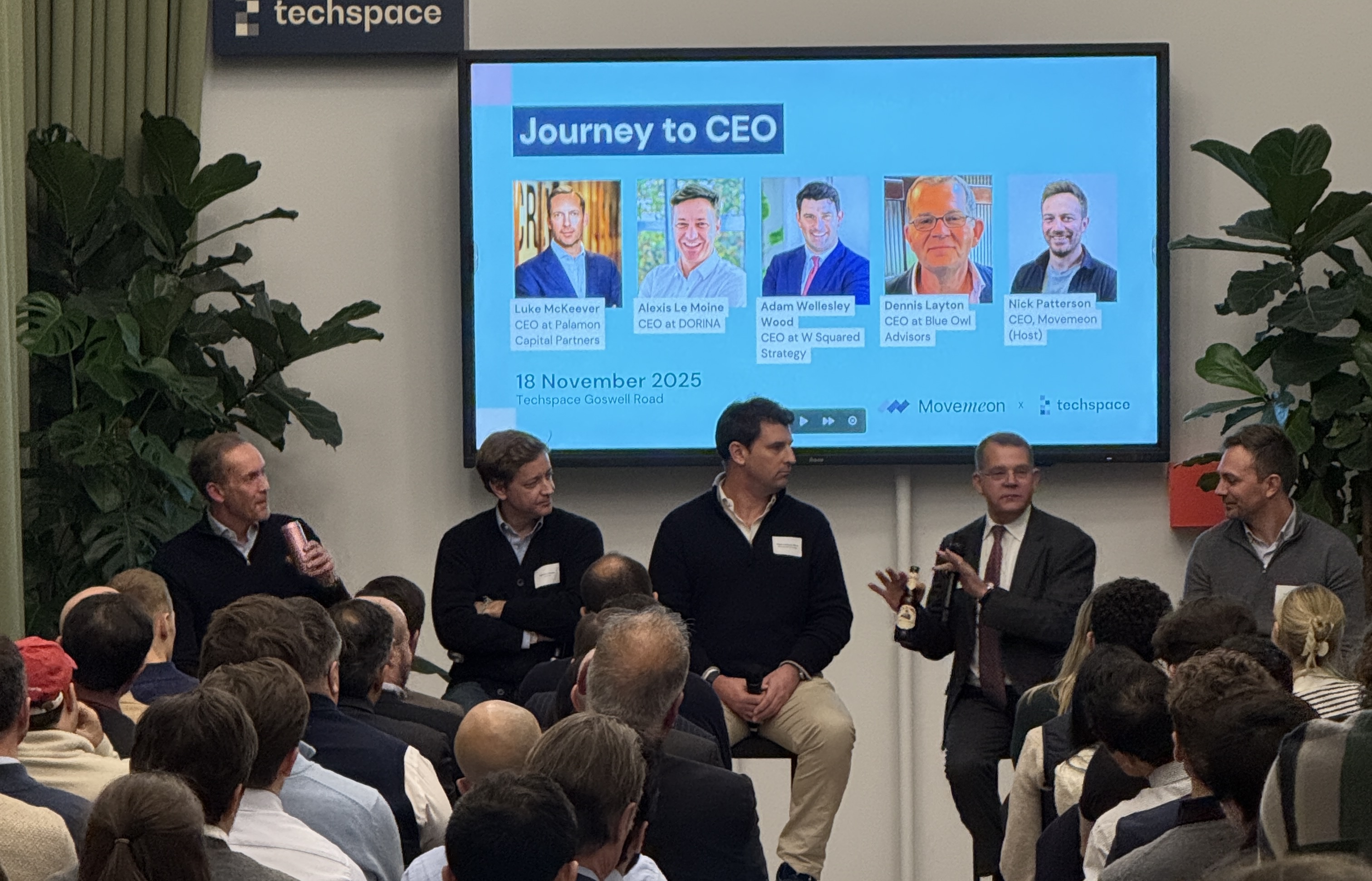A Strategist's Mini Playbook on AI
Explore how generative AI can benefit strategy consultants, with input from AI expert Adam and McKinsey’s Inside the Strategy Room podcast.

Table of contents
Tags
Subscribe to our Newsletter
If Movemeon co-founder Richard Rosser’s recent poll is anything to go by, plenty of our LinkedIn network has already started using generative AI.
Following the poll, Rich sat down with AI expert Adam Cox to discuss the implications of the technology. Off the back of that call, we’ve put together this mini playbook on how strategists can use the technology.
If you prefer to see the whole discussion in video format, click below to watch it.
https://www.youtube.com/watch?v=Vmq9zp2AHR8
Follow our Youtube channel to make sure you don't miss any exciting interviews with leaders and to get the most exciting industry insights.
The end of management consulting?
Depending on who you speak to, generative AI either “spells the end of management consulting as we know it,” or is a total game-changer.
Just like AI, we can’t predict the future. It’s impossible to say whether the alarmists are correct, or whether future generations will look back on the current era in the same way we now view, say, the rise of the computer, the electronic calculator, or the Jacquard loom, which so terrified and incensed the original Luddites.
We can, however, offer insight into how strategists that want to adopt this technology might be able to benefit from it. With the help of Adam Cox, AI expert and Chief Strategy Officer of cybersecurity firm Reflare, that’s exactly what we’ve set out to do.
Explore your career through Movemeon by finding your next opportunity on our platform!
The strategist’s AI playbook
Uptake
Movemeon co-founder Richard Rosser recently conducted a poll on LinkedIn asking his network, most of whom work in fields related to strategy consulting, the extent to which they are currently using generative AI. 28% of respondents said they currently use it regularly; 42% replied that they were just starting to use it; 19% said that they hadn’t yet but that it was on their to do list; while 10% said they hadn’t used it, and didn’t intend to.
Most strategists are already using AI in some form, and that the overwhelming majority intend to. How are they going about it?
Automate the mundane
Cox sees “strategy with a small ‘S’” as the main use to which AI is currently being deployed. This entails mundane tasks like “generic research, building out the paragraphs that are in an executive pre-reads before strategy away days, [and generating] filler content” for decks and presentations.”
Inspire the big picture
There are also use cases for strategy “with a big ‘S.’” These, say Cox, involve sparking ideation, through the use of query statements to explore the ramifications of different hypothetical scenarios.
“It’s producing a full whiteboard for everyone in the team to sit around and then riff off,” says Cox. Along with scenario planning, this is the main type of task that Ai is currently assisting.
Drive deeper insights
However, strategists may barely be scratching the surface of what generative AI is capable of, even in its current, early form. Yuval Atsmon, a senior partner leading the McKinsey Center for Strategy Innovation, told McKinsey’s Inside the Strategy Room podcast that he believes executives are “missing opportunities to use AI in the building blocks of strategy.”
As well as simple analytics, this could include diagnostic interpretation of business metrics to understand root causes, and even predictive intelligence to anticipate future events – though Atsmon cautions that predictive AI is “difficult” and “risky.”
Challenge the trend
It could also, Atsmon suggests, be used to challenge decision-making biases. He suggests an example scenario where all participants in a strategy session agree unquestioningly with the CEO’s suggestion.
“AI could inform the room, ‘We might have a sunflower bias here,’ which could trigger more conversation and remind the CEO that it’s in their own interest to encourage some devil’s advocacy.”
Read more interviews with leaders, industry insights and success stories on the Movemeon blog.
Augment your skill set
Cox feels that the ultimate winners from AI will be those individuals who incorporate a solid knowledge of the technology into a versatile skill set to become a high value-add employee.
“You need to know the difference between being a good employee and a great employee,” he said. “I believe this is one of the main components that will separate the winners from the losers.”
Know the limits
AI is currently limited. Cox is at pains to stress throughout our chat that wise strategists don’t lift its output wholesale, and that they instead use it as a starting point to generate content they then refine themselves.
Similarly, as Atsmon points out, it shouldn’t be relied on to predict the future, or to generate strategies in full.
Beyond the limitations of the technology, there could be a case for businesses to moderate their adoption of AI for the sake of optics. While using AI to drive transformative business efficiencies may look great to institutional investors, the displacement of white collar jobs could turn middle class customers against companies known to be pursuing it aggressively.
Cox compares this effect to what groups like Extinction Rebellion have done to energy companies. “It’s the same sort of thing. [People will think] ‘DoI really want to deal with that company [if they’re using AI]?’”
Even without conscious boycotting, en masse displacement could restrict the cohort’s spending power.
This is a moment
Regardless, the technology has reached an inflection point which makes it impossible to ignore.
“Those who aren’t taking this seriously, it’s at their own peril,” said Cox. “This is a moment, mark my words.”
About the author: Dan McEvoy is a freelance writer and editor, with extensive experience in finance, technology, HR, recruitment, and marketing content.
For more exciting insights about careers after consulting, how to get the most out of consulting, how to hire current or former consultants and a lot more, join 33,000+ following Movemeon co-founder Rich on LinkedIn.
Looking to build a strategy team that’s ready to embrace AI? Contact Movemeon to find the right consultants to drive your business forward.
Are you a candidate? Register here.
[hubspot portal="25392842" id="24161966-77f0-499d-9230-0f71cee62bf7" type="form"]
Where Talent Meets Opportunity
Our exclusive network use us to find job that fit their skills, and thousands of Employers trust us to hire exceptional talent. Choose the path that matches your goals - start exploring or start hiring.
Our latest articles
We regularly publish up-to-date articles to keep you up-to-date on the market and our work.
.png)
A record quarter for Private Equity deals sees a sharp hardening in the hiring market
Talent supply tightens as PE demand surges: Inside Q4’s hardest hiring market in two years, where Private Equity accelerates, scale-ups hold steady, and Large Enterprises struggle to attract strategy and transformation talent.

What we can all learn from Private Equity about talent - McKinsey, HBR and our analysis
Private Equity has become one of the most influential forces in business, outperforming public companies through disciplined value creation and exceptional talent strategy. This article explains how PE achieves its results and why demand for ex-consulting talent is rising across the industry.
Join our exclusive global community
Receive exclusive data & insights on pay, benchmarking, and industry interviews to build a career that’s right for you.
Create an account today and start searching roles in under five minutes.






